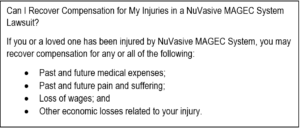Over 100,000 children in the United States are diagnosed with early onset scoliosis (EOS) annually. EOS is a condition in which a child below ten years of age develops curvature of the spine. According to scoliosis experts, some children with EOS may not require treatment because the condition will correct itself as they grow. However, others will require medical intervention to ensure the chest wall and lungs develop normally. Doctors will choose the best method of treatment depending on the child’s condition. For children with many years of growth ahead, doctors will use growing rods to guide the spine, like the NuVasive MAGEC system. However, the NuVasive MAGEC system may cause multiple adverse health effects. Reach out today to find out how a NuVasive MAGEC system lawsuit can help you.
Our law firm is currently handling lawsuits on behalf of children who have suffered severe injuries after receiving the NuVasive MAGEC System implant. Lawsuits against NuVasive claim that the implant can malfunction, causing device fracture and additional surgery to repair the damage.
In 2017, the FDA approved NuVasive’s MAGEC system to treat early onset scoliosis. The MAGEC system is a spinal implant that consists of growing rods that will straighten the child’s spine as it grows. NuVasive designed magnets and an external remote control to manage the MAGEC. Doctors have commonly used growing rods for years to remedy EOS. To straighten the spine, surgeons insert two rods on either side of the spine. With traditional rods, growing children must undergo “distraction” surgery roughly every six months to lengthen the rods. But, with NuVasive’s MAGEC system, doctors could bypass the need for invasive surgery by stretching the rods using the remote control and magnets. Therefore, the child would not need to endure multiple surgeries, but rather just one initial surgery to implant the rods.
In 2020, the Journal of Pediatric Orthopaedics and the Spine Surgery and Related Research published studies on the MAGEC system. Researchers found that the MAGEC system had a high failure rate compared to other growing rods and MAGEC patients may suffer additional health complications. NuVasive announced a recall in February 2020 due to the risk of mechanical failure when endcaps detach from the rod. This complication may expose a patient’s tissues to incompatible device components that can cause severe reactions in the body. This recall applied to various MAGEC models including the:
Again, in December 2020, an FDA Notice raised further concerns about the device. In April 2021, NuVasive announced that its device had biocompatibility issues and voluntarily halted shipment of all MAGEC system implants. The FDA continued to receive complaints about reactions to local tissues related to MAGEC defects. In July 2021, the FDA warned consumers that it continued to receive reports of mechanical failures and tissue incompatibility.
Eventually, the FDA approved NuVasive’s MAGEC X system which does not possess the previous endcap problem. Following this approval, NuVasive lifted the hold and placed the MAGEC X on the market. However, NuVasive announced that it will analyze new testing outcomes to determine the effects of these complications on patients.
NuVasive MAGEC Systems can malfunction when the rods fail to properly extend, the rods do not engage properly, the rods detach or bend, or the pins used to hold the rods break. When the rods or components degrade, metallosis (metal entering the blood) and bodily exposure to device components can occur. Metallosis slowly poisons the blood and can damage the nerves, bones, muscles, brain, heart, and kidneys. Furthermore, when a device is not biocompatible with the body it can cause life-threatening health complications. Patients may require extensive surgery to address these complications.
Parents have filed lawsuits against NuVasive that allege the MAGEC system caused their children to experience injuries such as contamination of surrounding tissues, bone damage, and increased pain. Several studies indicate that the NuVasive MAGEC System has an increased risk of device failure compared to other spinal implant treatments.

The Lake Law Firm was founded by Edward J. Lake, Esq., a personal injury lawyer for over 25 years. Our dedicated team of attorneys is committed to seeking justice on behalf of those who have suffered injury or death due to the negligence of others. Our experienced attorneys handle many different types of pharmaceutical drugs, medical devices, and other defective products. The lawyers in our firm have helped collect millions of dollars for their clients. The Lake Law Firm will advocate for you and your rights. Please contact us for a free confidential case evaluation at (888) 525-3529 or submit an inquiry on this page.
